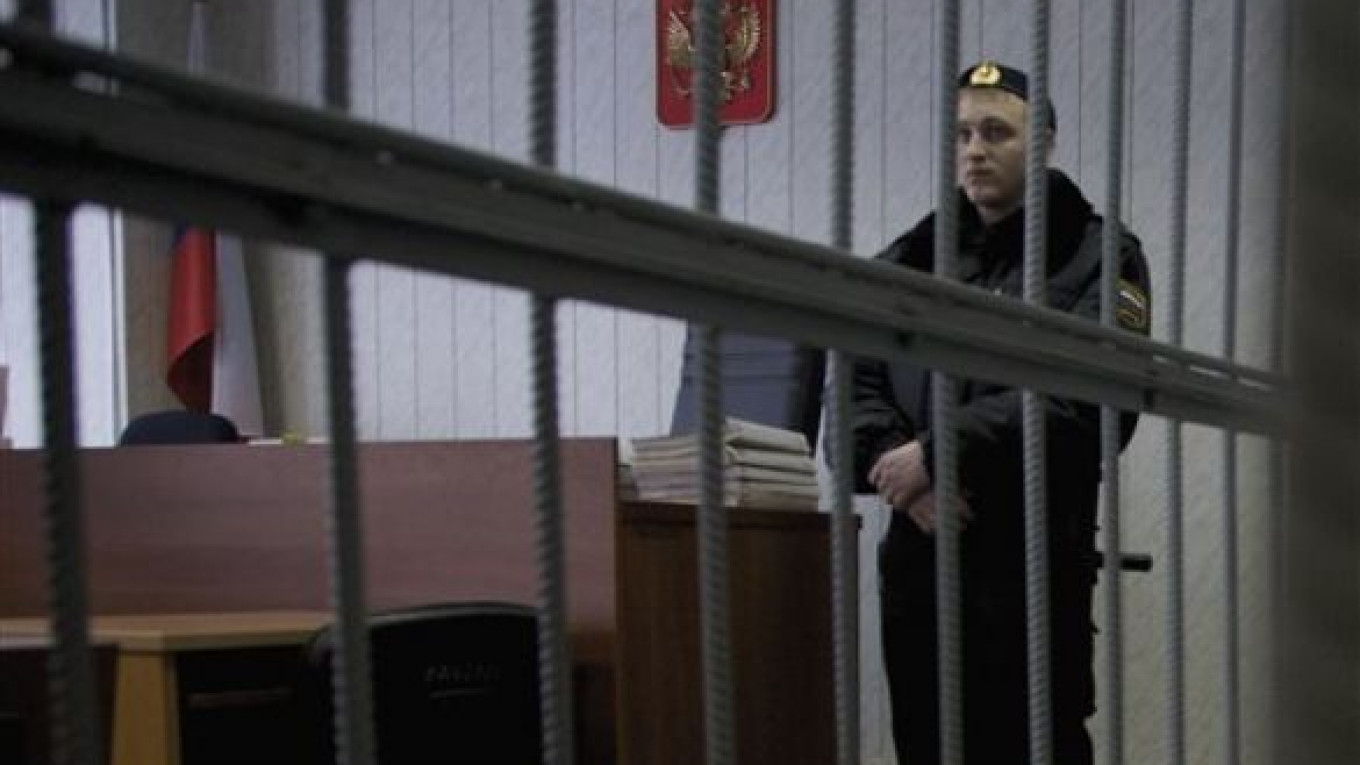A former co-worker of lawyer Sergei Magnitsky testified Wednesday in the posthumous trial of Magnitsky on tax evasion charges, saying the deceased defendant illegally implemented a tax scheme that provided benefits to companies employing disabled people.
Magnitsky is being tried along with his former employer, Hermitage Capital head William Browder, in a case that has been fiercely opposed by Magnitsky's family, which has called it a "blasphemy." It is rare for dead people to be tried on criminal charges, especially when the family opposes the prosecution. Browder lives in Britain and is being tried in absentia.
In a statement released Wednesday, Magnitsky's mother Natalya said the government needed a guilty verdict against her son to be able to say he was a criminal.
Magnitsky was imprisoned on tax evasion charges in 2008 after accusing officials of stealing $230 million in state funds, and he died in jail a year later. A Kremlin human rights council investigation found that he was severely beaten before he died, but the Investigative Committee dropped a case into his death earlier this month, saying there was no evidence of a crime.
The U.S. Congress passed a law last year allowing punishment of Russian human rights violators, including people implicated in Magnitsky's death, causing diplomatic tensions with Russia.
Prosecutors called Konstantin Ponomaryov, who worked with Magnitsky at audit firm Firestone Duncan in the mid-1990s, to testify at Tverskoi District Court on Wednesday regarding the prosecution's allegation that in the late 1990s, Magnitsky founded two companies in the Kalmykia republic with Browder that received illegal tax breaks.
According to prosecutors, the two subsidiaries, Dalnyaya Step and Saturn Investments, each employed Browder and two other workers, both of whom were allegedly disabled, allowing the firms to pay a 5.5 percent profits tax instead of 35 percent.
From 1992 to 2002, there was a law on the books that allowed a company to pay lower taxes if at least 50 percent of its employees were disabled, according to Sergei Varlamov, a lawyer at the Nalogovik law firm.
Ponomaryov told the court that he knew the details of the scheme because he came up with it and implemented it for Hermitage before leaving Firestone Duncan in December 1996.
But, he said, while Hermitage originally hired actual disabled people to work at the companies, under Magnitsky's direction the companies said they employed disabled workers but did not, while continuing to claim the tax benefits.
Via the subsidiaries, Hermitage was able to buy stock of major state companies including Gazprom and Sberbank without the "technical barriers" that typically applied to foreign companies, Ponomaryov said.
Asked by a defense lawyer how he knew that Magnitsky was responsible for implementing the tax scheme illegally in later years, Ponomaryov said he found out from media reports.
"In the 2000s, many more restrictions were introduced for using disabled people in business, which is why I was disappointed with Magnitsky when I found out he didn't create anything new and used my scheme," Ponomaryov said.
"I have no information that it was Magnitsky who did this — he honestly didn't confess it to me — but he stole my scheme, so why would he discuss it with me?" he said.
He also said Magnitsky had originally opposed the idea when Ponomaryov proposed it.
"I hired Magnitsky as an auditor and took him with me to business talks with Browder to discuss the scheme, but Magnitsky emphatically opposed the idea, saying he didn't want to participate in illegal activity," Ponomaryov said.
Jamison Firestone, a co-founder of Firestone Duncan, told The Moscow Times last week that he believed the tax case against Magnitsky was falsified by the same officers who stole the $230 million in state funds.
Ponomaryov said after the hearing that he didn't believe Firestone's version of events.
"Magnitsky died, and of course it's a tragedy, but that didn't eliminate what he did," Ponomaryov said, adding that he didn't believe that Magnitsky helped to uncover corrupt officials.
A representative of the Federal Tax Service, Anastasia Gerasimova, also testified Wednesday, telling the court that three checks had been conducted into Dalnyaya Step and Saturn Investments since 2001.
When a defense lawyer asked about the reason for the checks, Gerasimova responded only that they were "ordered by the [tax] service."
A total of 39 witnesses are set to testify in the case, and the judge set Monday as the next hearing date.
Contact the author at e.kravtsova@imedia.ru
Related articles:
A Message from The Moscow Times:
Dear readers,
We are facing unprecedented challenges. Russia's Prosecutor General's Office has designated The Moscow Times as an "undesirable" organization, criminalizing our work and putting our staff at risk of prosecution. This follows our earlier unjust labeling as a "foreign agent."
These actions are direct attempts to silence independent journalism in Russia. The authorities claim our work "discredits the decisions of the Russian leadership." We see things differently: we strive to provide accurate, unbiased reporting on Russia.
We, the journalists of The Moscow Times, refuse to be silenced. But to continue our work, we need your help.
Your support, no matter how small, makes a world of difference. If you can, please support us monthly starting from just $2. It's quick to set up, and every contribution makes a significant impact.
By supporting The Moscow Times, you're defending open, independent journalism in the face of repression. Thank you for standing with us.
Remind me later.


